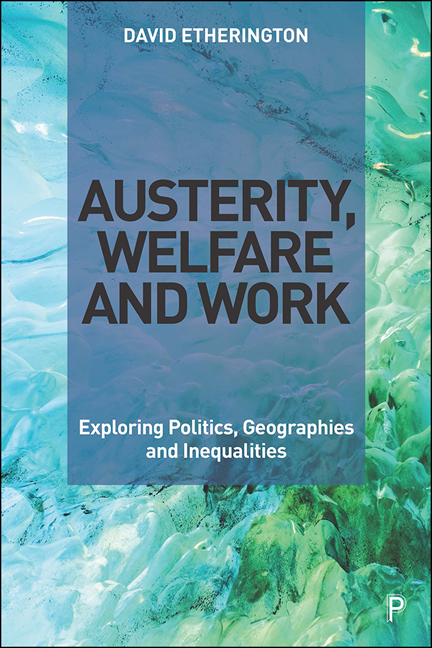Book contents
- Frontmatter
- Dedication
- Contents
- List of Tables and Box
- List of Abbreviations
- Notes on the Author
- Acknowledgements
- Preface
- 1 Introduction: the Crisis and Austerity Neoliberalism
- 2 Conceptualising Austerity, Welfare and Employment Relations
- 3 Embedding Neoliberal Austerity: from New Labour to the Conservative Government
- 4 Resisting Welfare Reforms and Work-First Policies
- 5 ‘Devolving’ Welfare Policies in Greater Manchester’s Precarious Economy
- 6 Challenging Welfare Conditionality and Insecure Work
- 7 Towards a more Inclusive Labour Market: Lessons from Denmark
- 8 Conclusions: Progressive Alternatives to Austerity
- Notes
- References
- Index
1 - Introduction: the Crisis and Austerity Neoliberalism
Published online by Cambridge University Press: 10 March 2021
- Frontmatter
- Dedication
- Contents
- List of Tables and Box
- List of Abbreviations
- Notes on the Author
- Acknowledgements
- Preface
- 1 Introduction: the Crisis and Austerity Neoliberalism
- 2 Conceptualising Austerity, Welfare and Employment Relations
- 3 Embedding Neoliberal Austerity: from New Labour to the Conservative Government
- 4 Resisting Welfare Reforms and Work-First Policies
- 5 ‘Devolving’ Welfare Policies in Greater Manchester’s Precarious Economy
- 6 Challenging Welfare Conditionality and Insecure Work
- 7 Towards a more Inclusive Labour Market: Lessons from Denmark
- 8 Conclusions: Progressive Alternatives to Austerity
- Notes
- References
- Index
Summary
But in banking, as in capitalism in general, it's one rule for the elite and another for the rest of us. On the day Deutsche Bank began making thousands of employees redundant, some managing directors at the company's office in the City of London were being fitted for suits that cost at least £1,200. Tailors from Fielding & Nicholson, an upmarket tailor, were pictured walking out of the bank's UK office with suit bags. Ian Fielding-Calcutt, the tailor's founder, and Alex Riley were there to fit suits for senior managers in spite of plans to cut 18,000 jobs worldwide. Deutsche's chief executive, Christian Sewing, has repeatedly said how much he regretted the decision to scrap a fifth of his global workforce. But it did not stop him paying out €50m in golden handshakes to top executives since 2018. (Roberts, 2019)
Estimates of the size of the UK bank bailout range between £289 billion and £550 billion – or nearly £10,000 for every British resident – exceeding the £203 billion of tax that the sector paid in the five years up to 2006–2007 … by the end of 2009 the total value of bailouts in the US, UK and euro area equalled $14 trillion, or almost a quarter of the world's gross domestic product. (Sayer, 2016: 229)
We know that there's appetite in the Conservative party for a bonfire of workers’ rights. (O’Grady, 2018)
Welfare reform employment relations and labour Discipline
The 2008 financial crisis and the near collapse of the financial system brought about a response from nearly all developed and developing capitalist countries that is referred to as austerity; this is generally viewed as a strategy for cutting back public expenditure in order to reduce public debts. This was based on thinking by the dominant elites that balancing finances was a crucial factor in bringing about further growth. Sacrifices had to be made for the greater good. We are now living in an age of austerity. While the term austerity is generally used to mean public expenditure cuts, as will be argued in this book, there is more to it. Richard Seymour defines austerity as comprising several elements (Seymour, 2014: 3–4). First, it is focused on reducing government budget deficits through a combination of public spending cuts and usually regressive tax hikes.
- Type
- Chapter
- Information
- Austerity, Welfare and WorkExploring Politics, Geographies and Inequalities, pp. 1 - 18Publisher: Bristol University PressPrint publication year: 2020



